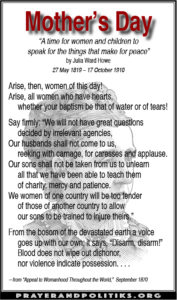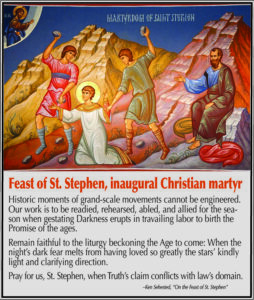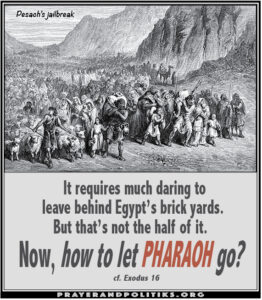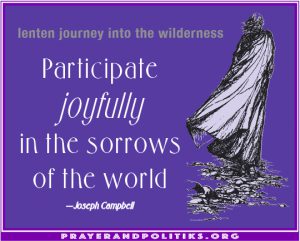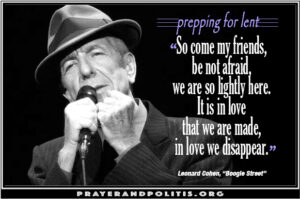A meditation for fellow US citizens
Ken Sehested
Invocation. More than 200 South African firefighters singing and dancing after arrival at the Edmonton, Alberta airport, to help their Canadian colleagues extinguish wildfires that have broken out across the country. This is serious work and requires the ritual preparation to focus the mind, the heart, and the will. (Which is what liturgy should be.)
§ § §
A belated “Happy Canada Day” to our Canuck friends, on the occasion of their nation’s birth anniversary on 1 July 1867. It’s different from the US “independence day” since they achieved sovereignty from Britain over a period of decades and without a bloody revolution.
Two decades ago, responding to an article on the history of US imperial ambitions—where I mentioned a once-threatened invasion of Canada by the US—a friend in Canada, Scripture scholar Ray Hobbs—responded by saying, “not only threatened but carried out—in fact, four times.”
(For more, see “4 Times the U.S. Invaded Canada,” James Erwin.)
Those invasions were never mentioned in my history classes (or, likely, in yours).
Heather Cox Richardson points out other excluded background information surrounding our nation’s war of independence. As late as 1763, at the conclusion of what is referred to here as the French and Indian War, British colonists experienced an economic boom. Moreover, with the French relinquishing claims to land west of the Appalachian Mountains, the prospect of yet more free land and natural resources fueled entrepreneurial ambition.
However, Britain had no desire to fund yet another expensive war with Native Americans, which would surely happen if colonists began flooding west across the mountains. Such expansion was outlawed by the Parliament, which also passed multiple tax legislation affecting the colonies to help pay for the war.
For sure, the championing of freedom as a political virtue was an express ideal leading to the founding of the United States. But woven throughout—then as now—were pecuniary interests. Money is free speech, according to the US Supreme Court, first in the 1976 Buckley v. Valeo case, widened further in the 2010 Citizen United v. Federal Election Commission decision.
Or, to put it baldly, the wealthy (and a corporation is now a “person”) get more than one vote.
As has been said, money talks. Louder still as the decimal points accumulate.
§ § §
Hymn of confession. “What makes a gringo your smart aleck lingo / When he stole this land from the Indian way back when / Don’t he remember the big money lender / That put him a lincoln parked where his pinto had been / The almighty peso that gives him the say so / To dry up the river whenever there’s crops to bring in / Such a good neighbor to take all his labor / Chase him back over the border till he’s needed again.” —Merle Haggard, “The Immigrant”
§ § §
Democratic aspiration and commercial gain have been bound together since the arrival of the first English immigrants to our shores. But as Jon Meacham points out in Gospel: God, the Founding Fathers, and the Making of a Nation, of the 1606 First Charter of Virginia’s 3,805 words, only three percent are about God, the rest about commercial enterprise. As Captain John Smith of the Virginia Company wrote, “Faith was their color, when all their aim was nothing but present profit.
There was more piety in Puritan Massachusetts, of course. But their exercise of religious freedom was for their own kind. Meacham quotes the English Lord Bishop of Salisbury complaining, “Every party cries out for Liberty & toleration, till they get to be uppermost, and then will allow none.” In fact, the1650 Connecticut Code bluntly stipulates that “If any man shall have or worship any God but the Lord God, he shall be put to death.”
There is no doubt in my mind that the US Declaration of Independence represents the most politically far-reaching ideas of its time, beginning with those majestic lines of the second paragraph:
“We hold these truths to be self-evident, that all men are created equal, that they are endowed by their Creator with certain unalienable Rights, that among these are Life, Liberty and the pursuit of Happiness.—That to secure these rights, Governments are instituted among Men, deriving their just powers from the consent of the governed. . . .”
Recall the words of colonial leader Thomas Paine who wrote his broadly circulated “Common Sense” pamphlet in January 1776: “For as in absolute governments the King is law, so in free countries the law ought to be King.” Paine rejected the idea that any person could be born to rule others. Consent by the governed as the basis of civil society was a radically new notion in this period.
Sensing the dramatic novelty of this epoch, Paine issued this breathtaking claim: “We have it in our power to begin the world over again.”
§ § §
Hymn of revelation. “Padded with power here they come / International loan sharks backed by the guns / Of market hungry military profiteers / Whose word is a swamp and whose brow is smeared / With the blood of the poor / Who rob life of its quality / Who render rage a necessity / By turning countries into labour camps / Modern slavers in drag as champions of freedom. . . . / And they call it democracy.” —Canadian artist Bruce Cockburn, “Call It Democracy” (Calling out the International Monetary Fund, a global financial institution about which few in the US know.)
§ § §
One of the great historical ironies associated with the US Declaration of Independence is the fact that Ho Chi Minh, emerging leader of the Democratic Republic of Vietnam—against which the US fought its longest war of the 20th century—quoted extensively from the Declaration in the founding of his party in September 1945.
But between the issuance of the Declaration and the writing of the US Constitution several years later, profound differences in economic policy emerged, threatening to sever the ties that had united the colonies in the war against British rule.
Slavery had already become the dominant economic generator in the Southern colonies, where industrial scale agriculture blossomed—and would compete, in the decades to come, with the Northern colonies’ development of industrial scale manufacturing.
The authoring and editing of the US Constitution was fraught with tension, most explicitly over the question of slavery. The resulting compromise ended with the sanctioning of enslavement.
The “Father of the Constitution,” James Madison, attacked slavery early in the Constitutional Convention, stating, “We have seen the mere distinction of colour made in the most enlightened period of time, a ground of the most oppressive dominion ever exercised by man over man.”
In line with Madison’s conviction, Thomas Jefferson attacked the trade in human bondage, calling it a “cruel war against human nature itself, violating its most sacred rights of life and liberty”—though he himself profited greatly from the institution.
Such was the moral ambiguity built into the Constitution’s framers. To be sure, Jefferson did not believe that African Americans were social equals. (Nor did future President Abraham Lincoln, who, like many white abolitionists, supported repatriation of slaves to Africa.)
Jefferson described them “as incapable as children,” and admitted that maintaining slavery was like holding “a wolf by the ear, and we can neither hold him, nor safely let him go.”
In the end, the writers reached a compromise. Three provisions in the final draft of the Constitution provided partial limitations on the practice: the Three-Fifths Clause, the ban on Congress ending the slave trade for twenty years, the fugitive slave clause, and the slave insurrections.
Yet to hide its ignominy, the final draft resorted to euphemisms rather than use the words “slave” or “slavery.”
If the temporary confederation of colonies (for the purpose of ending British rule) were to survive as a coherent nation-state, the financial boon of chattel slavery had to be warranted—and not just for Southerners. Northern business interests, particularly the banking, shipping and insurance industries, were essential to slavery’s maintenance.
§ § §
Hymn of assurance. “O my soul, my soul, my soul / You are Holy, wholly, my whole life / For the lowly, the lambs, he breaks the / Empire’s knife, empires knife” —“Magnificat,” The Psalters
§ § §
The lofty sentiment of the Declaration’s “all men are created equal” was a myopic aspiration. The celebration of freedom was literally for men only, and not even for all men. Voting rights was largely restricted to white property owners. Slavery would not be abolished for another 76 years with the ratification of the 13th Amendment to the Constitution. The franchise for women wouldn’t be approved until 1920; and nearly a half-century more before the Voting Rights Act assured Black voting rights. Even now, the US Supreme Court is chipping away at those voting rights provision.
The virtues of democratic governance celebrated on our nation’s Independence Day has from our founding been in competition with the interests of a “free” market economy. Though the word “God” is absent from the Constitution, the framers implicitly affirmed that, yes—in contradiction to the New Testament—both God and Mammon can be served simultaneously.
The instability of these competing aspirations was evident from the beginning. It was Jefferson who wrote, in 1816, that “The end of democracy and the defeat of the American Revolution will occur when government falls into the hands of lending institutions and moneyed corporations.”
This sentiment would later be expressed in the writing of President Abraham Lincoln: “I see in the near future a crisis approaching that unnerves me and causes me to tremble for the safety of my country. . . . [C]orporations have been enthroned and an era of corruption in high places will follow, and the money power of the country will endeavor to prolong its reign by working upon the prejudices of the people until all wealth is aggregated in a few hands and the Republic is destroyed.”
Then again, in the 20th century, President Woodrow Wilson complained: “If monopoly persists, monopoly will always sit at the helm of government. I do not expect monopoly to restrain itself. If there are men in this country big enough to own the government of the United States, they are going to own it.”
President Theodore Roosevelt went so far as to say, “All contributions by corporations to any political committee for any political purpose should be forbidden by law.”
As has been said, money doesn’t just talk in politics, it also silences.
§ § §
Altar call. “I am a son of Uncle Sam / And I struggle to understand the good and evil / But I’m doing the best I can / In a place built on stolen land with stolen people / We are more than the sum of our parts / All these broken homes and broken hearts / God will you keep us wherever we go / Will you forgive us for where we’ve been / We Americans.” —Avett Brothers, “We Americans”
§ § §
Any accurate accounting of the competing interests in our nation’s founding must be attentive to the prophetic protestation of the great abolitionist Frederick Douglass’ 5 July 1852 speech, “What to the Slave is the Fourth of July?”
“Had I the ability, and could I reach the nation’s ear, I would today pour out a fiery stream of biting ridicule, blasting reproach, withering sarcasm, and stern rebuke. For it is not light that is needed, but fire; it is not the gentle shower, but thunder. We need the storm, the whirlwind, and the earthquake. The feeling of the nation must be quickened; the conscience of the nation must be roused, the propriety of the nation must be startled; the hypocrisy of the nation must be exposed; and its crimes against God and man must be proclaimed and denounced.”
His assessment is as indisputable now as then. The slave trade was the original sin of our nation. Clearly, there have been sporadic, courageous, and efficacious movements to right that wrong, and we rightly recollect and celebrate those narratives. We do so not to exhaust or satisfy the longing for justice, but to inform, to sharpen, and to animate the ongoing struggle, to lay claim, as Dr. King reminded in his 1963 “I Have a Dream” speech, to that “promissory note” of freedom’s “inalienable rights of life, liberty and the pursuit of happiness.”
And to do so, we must move beyond King-quoting.
The provocative words of 18th century patriot Thomas Paine have never been more prescient than to our current political climate. When reflecting “on the precariousness of human affairs,” a “constitution of our own” based on the rule of law must be established.
“If we omit it now, some [dictator] may hereafter arise, who laying hold of popular disquietudes, may collect together the desperate and the discontented, and by assuming to themselves the powers of government, may sweep away the liberties of the continent like a deluge.”
§ § §
Benediction. “. . . from the staggering account / of the Sermon on the Mount / which I don’t pretend to understand at all. / It’s coming from the silence / on the dock of the bay, / from the brave, the bold, the battered / heart of Chevrolet: / Democracy is coming to the U.S.A.” —Canadian artist Leonard Cohen, “Democracy” (Click the “show more” button to see the lyrics.)
# # #
Resources for this article include:
• “July 2, 2023,” Heather Cox Richardson, “Letters From An American”
• Gospel: God, the Founding Fathers, and the Making of a Nation, Jon Meacham
• “Slavery and the Constitution,” Bill of Rights Institute
• “James Madison’s Notes on the Debates in the Federal Convention, May 25, 1787”
• “Jefferson’s Attitudes Toward Slavery”
• “What to the Slave is the Fourth of July?” Frederick Douglass
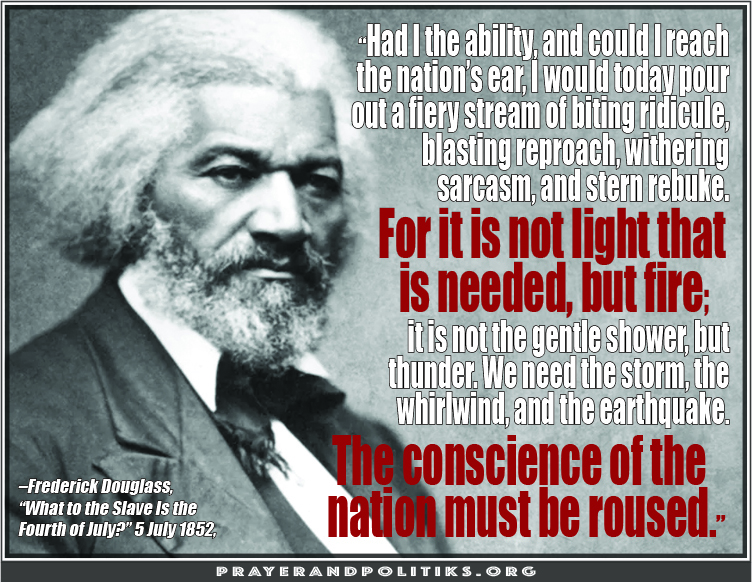


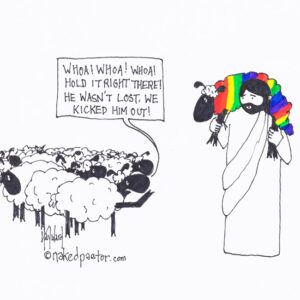 “John Wesley recognized such violence hidden in the clean and tidy profits of slave traders and owners. He exposed it, addressing them with the fire of a prophet: ‘Thy hands, thy bed, thy furniture, thy house, thy lands are at present stained with blood.’
“John Wesley recognized such violence hidden in the clean and tidy profits of slave traders and owners. He exposed it, addressing them with the fire of a prophet: ‘Thy hands, thy bed, thy furniture, thy house, thy lands are at present stained with blood.’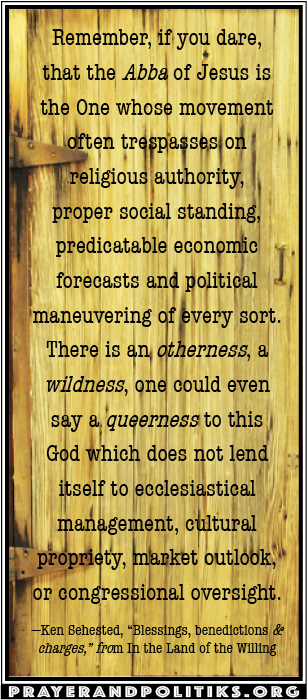 Too much of the “nones” tradition, of those claiming no religious affiliation, is fueled by the increasing isolationist and narcissistic tendencies that plague modernity in all its forms. The powers that be want to turn us all into consumers. That kind of “freedom” is the worst kind of bondage.
Too much of the “nones” tradition, of those claiming no religious affiliation, is fueled by the increasing isolationist and narcissistic tendencies that plague modernity in all its forms. The powers that be want to turn us all into consumers. That kind of “freedom” is the worst kind of bondage.
